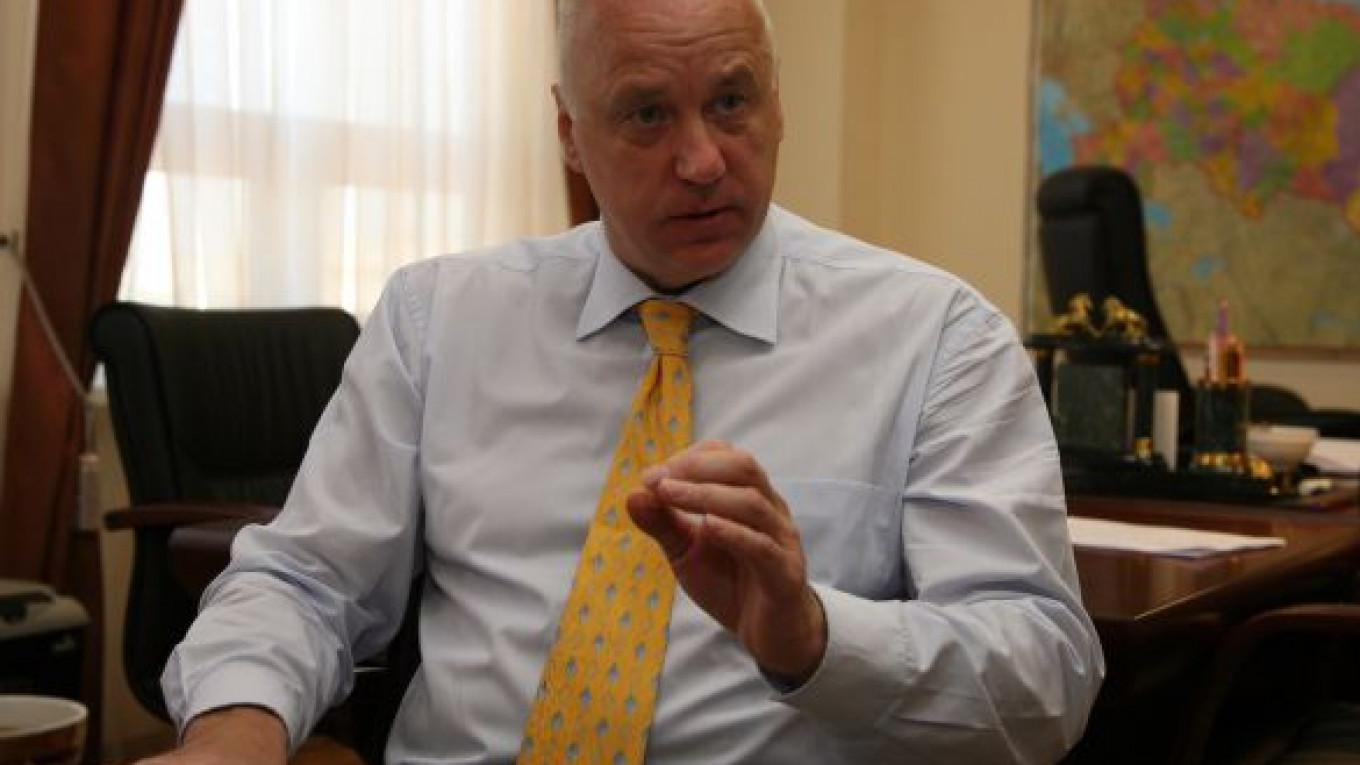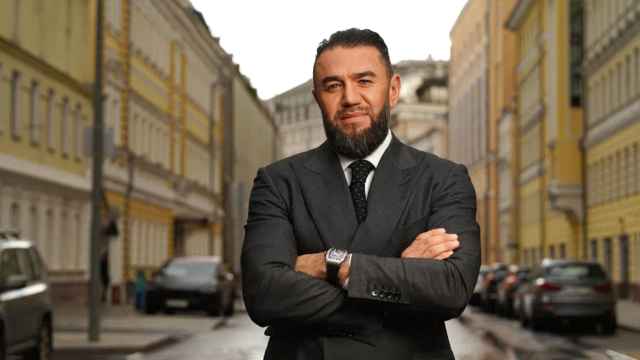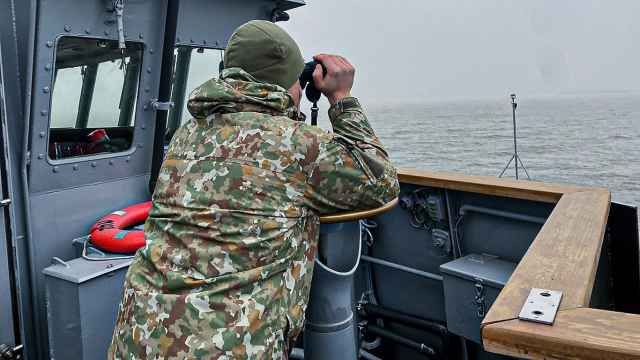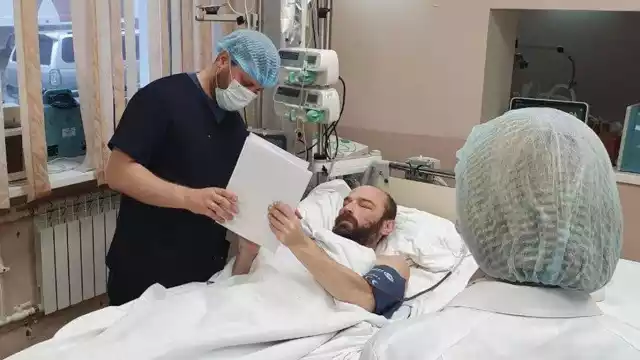A liberal-leaning newspaper claimed Wednesday that the Investigative Committee's chairman threatened one of its reporters, who has since fled the country for fear of his safety.
Novaya Gazeta editor-in-chief Dmitry Muratov, in an open letter published on the newspaper's website, accused Alexander Bastrykin of making the threats on a roadside bordering a Moscow region forest after the reporter had been driven there by Bastrykin's security guards.
Muratov later told Radio Liberty that the reporter, deputy editor Sergei Sokolov, had fled the country. Muratov has not disclosed the actual threats.
Sokolov was alone with Bastrykin when the threats were made, the letter said. Bastrykin is one of the nation's most senior law enforcement officials.
Recently, Sokolov wrote that he was outraged by the relatively soft sentencing of Sergei Tsepovyaz, a reputed member of the notorious Kushchyovskaya gang, which murdered 12 people, including small children, in 2011.
Tsepovyaz was fined 150,000 rubles ($4,600) for covering up the crime. The court ruled that he did not participate in the murder. Two other men who share Tsepovyaz's last name were found guilty of murder and sentenced to 20 years in prison.
In the article on the crime, Sokolov calls Bastrykin, as well as President Vladimir Putin and Prosecutor General Yury Chaika, "servants of countless Russian 'Tsapoks.'" The Kushchyovskaya gang's reputed mastermind, Sergei Tsapok, is currently in jail awaiting trial.
Muratov said Sokolov has since publicly apologized for that remark.
In 2006, Novaya Gazeta journalist Anna Politkovskaya, who gained prominence for her reporting from Chechnya, was gunned down in her apartment building in Moscow. Her murder remains unsolved.
Muratov said in the letter Wednesday that Bastrykin spoke negatively about the paper's editorial policy and mentioned Politkovskaya in a derogatory way.
Muratov stated that while he took Bastrykin's words "seriously," he declined to quote Bastrykin's words against Politkovskaya in order "not to participate in a clan war of law enforcement officials."
Muratov was referring to the ongoing struggle between the Investigative Committee and the General Prosecutor's Office over political influence.
The reformed Investigative Committee now has authority over all the nation's investigations, whereas the Prosecutor General's Office has lost its ability to investigate crimes on its own.
The Investigative Committee did not comment on the alleged threats by Wednesday evening.
Muratov called on Bastrykin to "guarantee security" for Sokolov and said the threats were "empty" due to Bastrykin's "emotional state."
The alleged threats against Sokolov prompted protests outside the Investigative Committee's headquarters on Wednesday.
Published three times a week, Novaya Gazeta is jointly owned by billionaire Alexander Lebedev and former Soviet President Mikhail Gorbachev.
Analysts said such threats might have stemmed from Bastrykin's personal ties to Putin. The two were classmates at Leningrad University Law School.
Vladimir Prybilovsky, head of the Panorama think tank, said Bastrykin's connections to Putin make him "rather powerful."
Prybilovsky said Bastrykin is someone who would "pursue a hardline course" against the opposition, referring to searches conducted at homes of opposition leaders, including Alexei Navalny, on the eve of Tuesday's protest march in Moscow.
United Russia Deputy Alexander Khinshtein said at the time that Bastrykin was trying to "serve" Putin by putting pressure on the opposition.
Yelena Pozdnyakova, an expert with the Center for Political Technologies, said Bastrykin is trying to suppress negative publicity against him, which shows that he is "nervous" about the situation.
"Novaya Gazeta has always irritated him," she said.
But Pozdnyakova added that it is still unclear whether Novaya Gazeta, known for its highly critical articles, might have exaggerated the scandal in order to attack Bastrykin, Putin's ally.
This is not the first time that Bastrykin has been mired in a media scandal.
In 2008, United Russia Deputy Khinshtein accused Bastrykin, then a deputy prosecutor, of possessing undeclared property abroad.
It turned out that the property had been registered before Bastrykin became a law enforcement official.
A Message from The Moscow Times:
Dear readers,
We are facing unprecedented challenges. Russia's Prosecutor General's Office has designated The Moscow Times as an "undesirable" organization, criminalizing our work and putting our staff at risk of prosecution. This follows our earlier unjust labeling as a "foreign agent."
These actions are direct attempts to silence independent journalism in Russia. The authorities claim our work "discredits the decisions of the Russian leadership." We see things differently: we strive to provide accurate, unbiased reporting on Russia.
We, the journalists of The Moscow Times, refuse to be silenced. But to continue our work, we need your help.
Your support, no matter how small, makes a world of difference. If you can, please support us monthly starting from just $2. It's quick to set up, and every contribution makes a significant impact.
By supporting The Moscow Times, you're defending open, independent journalism in the face of repression. Thank you for standing with us.
Remind me later.






